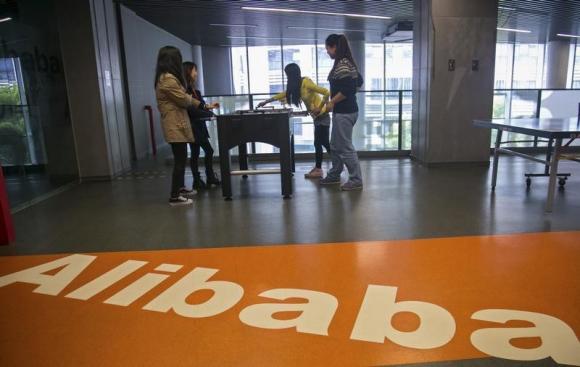Alibaba Is Investing big in U.S. Tech Companies

Chinese Internet retailer, Alibaba Group, is going to America with plans for big investment.
In March, Alibaba made a $215 million investment in Tango, a messaging app. It recently contacted Snapchat, another messaging app that this year turned down a $3 billion acquisition offer from Facebook, about making a big investment that would value the young company at $10 billion.
There’s more: Alibaba participated in a $170 million round for Fanatics, an online sports memorabilia retailer. And on Thursday, Kabam, a video game start-up, announced that it has received a $120 million investment from Alibaba. The new round gives Alibaba a board seat and what is likely a significant stake in Kabam, which said it is now worth more than $1 billion.
The recent burst of activity — including a half-dozen investments in the United States over the past year or so — comes as the Internet behemoth prepares one of the most highly anticipated market debuts since Facebook’s two years ago. Alibaba is expected to begin trading in September at a market value of perhaps $200 billion, potentially making it one of the biggest initial public offerings ever.
It would be simple to declare that Alibaba, which became a tech powerhouse by amassing a sprawling collection of businesses in its home country, is trying to take its omnivorous approach to the United States, and it is willing to spend big to make that happen.
But the recent investments aren’t just about size. Alibaba is also rubbing elbows in the sometimes insular world of Silicon Valley-funded start-ups, where a handful of plugged-in financiers can help the company spot the next breakout smartphone app or e-commerce trend before it hits the mainstream.
“With investments like these, they get good products, they make a splash, and most importantly, they build connections and trust amongst the venture capitalists,” said Sameet Sinha, an Internet analyst with B. Riley & Company, a small investment firm.
A spokesman for Alibaba declined to comment on its investment strategy, though the Chinese company has outlined the principles behind its approach in documents filed for its I.P.O. In the formal language of regulatory papers, Alibaba said it wants to get more users, improve how they use its services and improve its customers relations.
It is not so clear, of course, how investments as different as sports memorabilia and messaging apps fit neatly into that plan, but it is clear that Alibaba has made its North American investments a priority.
They are led by Michael Zeisser, a native of France who formerly led the digital commerce division of Liberty Media. Mr. Zeisser was recruited by — and reports to — Joseph C. Tsai, Alibaba’s vice chairman.
Given a broad mandate by Alibaba’s top management, Mr. Zeisser and his team have been charged with nothing less than turning their employer into a global Internet and e-commerce colossus.
“When you own 45 percent of the e-commerce market in China and you want to continue to grow, international market share is obviously a green field that you can go after,” said Eric Setton, Tango’s chief technology officer and co-founder.
That has led to an array of investments in other seemingly disparate companies, including Lyft, a popular ride-sharing service that recently started operating in New York, and ShopRunner, an e-commerce delivery start-up.
Though they may appear loosely connected, many of the stakes that Alibaba has taken have focused on mobile and e-commerce. Tango has hinted that it plans to introduce some form of shopping in its services, while Kabam offers Alibaba the chance to learn about in-app purchases.
Elsewhere, in recent months Alibaba has struck deals to buy full control of AutoNavi, a Chinese mapping service listed in the United States, and a 50 percent stake in one of China’s top soccer teams. According to some reports — and distressingly to some potential investors — Alibaba co-founder Jack Ma decided to buy the stake in Guangzhou Evergrande in about 15 minutes after having had drinks with the club’s owner.
Alibaba’s investment plan is not aimed at directly competing with established American Internet heavyweights like Amazon and eBay, however. In its I.P.O. prospectus, Alibaba says that its investments will remain focused on China, where the company still sees enormous growth potential.
For the American start-ups in Alibaba’s embrace, there are benefits beyond the investment. Kabam, for instance, receives a direct line into China, one of the fastest growing smartphone and gaming markets of the past decade. Some 40 percent of global smartphone shipments in the first quarter of 2014 were bound for Chinese consumers, according to IDC, a research firm.
It is not, however, a simple market for a Western company to enter. Alibaba’s knowledge of China’s web-connected consumers could help American start-ups navigate the unfamiliar landscape.
“Entering Asia is very complex,” said Kent Wakeford, chief operating officer of Kabam. “There are different payments systems, different types of phones and tablets to deal with. Even the culturalization is different.”
Mr. Zeisser and his team have spent significant amounts of time helping their newfound partners, executives at the portfolio companies have said, advising on strategies and helping solve problems.
“They’ve been quite active and contribute significantly on our strategy,” Mr. Setton of Tango said. “They have also given us the financial chops to be able to do things we wouldn’t have been able to do before.”
Source: NYT



























